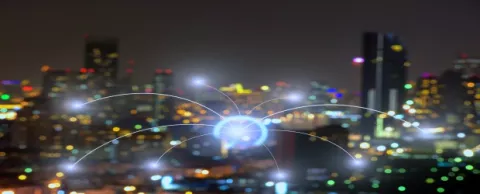
Set in Lebanon’s Northern Matn region, the countryside residential community of BeitMisk spans 13 plots and features stunning views of capital city Beirut and the Mediterranean. While it’s modelled after a traditional village, this town is offering up a more modern lifestyle than what residents are used to. Working with national telecommunications service Ogero, BeitMisk has ramped up its fibre optics to boost Internet speed and become Lebanon's first smart city. Here's how the city is becoming a leader in Lebanon, relying not only on fibre optics but also on an advanced digital infrastructure.-Philippe Leonard
A new look for an old country
In BeitMisk, the plan for the Smart City project is to test out different types of technology that can later be duplicated in other parts of the country, proving to the world that Lebanon is not only a developed country but one that can bring together the public and private sector to create digital advances. BeitMisk already operates as a “city of the future,” with 75 percent of the area being green space—a larger percentage than other local real estate developments—and operations that include environmentally friendly techniques, which assist with everything from irrigation to lowering levels of CO2. Smart projects include planting varieties of trees and plants that only require a small amount of water and treating sewage for reuse in irrigation of the city’s green spaces. All new residential units are outfitted with solar heaters and energy-efficient LED lighting, using 90 percent less energy. In addition, the city has turned to natural gas instead of diesel for space and water heating in an effort to significantly reduce the amount of CO2 emissions.
"BeitMisk's identity has been defined right from the start as a real green village by its nature and clean climate, and at the same time as an integrated city adopting modern technologies," said project chairman Georges Zard Abou Jaoude in an article for Telecom Review. "From the very beginning, our ambition was to be a modern yet environmentally friendly village."
With the introduction of the fibre optic transmission project, the city can take its smart services to the next level. Thanks to the Internet of Things, the city and its information will all be connected with sensors that offer up real-time readings of water and electricity, as well as air quality and pollution. For citizens, this means that problems such as fires can easily be identified and solved with a system that can instantly start or stop pumps. As the network is tried and tested in the city, not only will citizens benefit, they’ll also help develop solutions that can spread and make the rest of Lebanon smarter.



